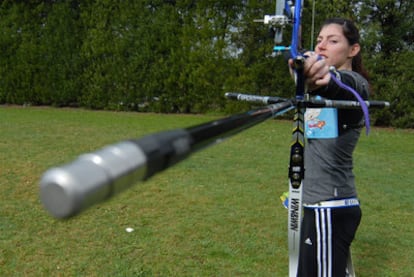Archery champion aims for Olympics
Three-time national prize winner Gema Buitrón hopes to look for a bull's eye in London
There is something magical in the figure of an archer. So much so that one was chosen as a focal point of the spectacular inauguration of the 1992 Barcelona Olympics. From the earliest settlers who used a bow as a tool for hunting and survival to those who discovered its worth as a weapon of war. From William Tell to the Indian tribes of North America, and today's sophistication of the sport at the highest level.
It is in this arena that Gema Buitrón plies her trade. The 21-year-old from As Pontes, Galicia, was recently crowned Spanish champion for the third time and she has her eye fixed firmly on the 2012 Olympics.
Buitrón dreams of representing her country in London and of popularizing a sport that is difficult to master and to see live. Archery has begun to benefit from fresh imagination; competitions are held in diverse landscapes, from a Croatian cove to the Hungarian countryside or the canals of Copenhagen where arrows skim across the surface of the water.
Buitrón fell into archery at an early age and has become a reference point in the sport; she features in the publicity for an archery simulator released by a well-known console maker. "I started in the village because my father went to an archery course on Sunday mornings and I wanted to do the same. I was seven," Buitrón, who had to leave Galicia to fulfill her potential, recalls. "There was a vital handicap: a lack of competition and technical focus, a lack of training for instructors. There is interest in the sport and clubs are springing up, but there is a major block because the federation doesn't give priority to the Olympic discipline. There was a development plan in Galicia and I was lucky that at the national level they selected me. But it didn't get off the ground."
The best archer in Galicia eventually moved to Madrid's Blume high-performance center to master her craft, a discipline that requires mental and physical strength and in which good technique is no guarantee of success. "The hardest thing in competition is to control your head, because you know you can shoot." The mind can be trained but the arm is less governable, she explains. Buitrón works with a psychologist. "It helps you to be in your own world," she says.
Competitions can last several hours and training sessions are marathons, but archers cannot stop for long. "You lose form very quickly. If you don't shoot for a week you pick up the bow and your arm shakes. Sometimes you train so much that you can forget you're there because you enjoy the sport."
Neither does the calendar offer respite. In June the world championships take place. Eight teams for the Olympics will be decided there, with 32 individual passports for the London Games, one per country. Buitrón has a good shot at both.

Tu suscripción se está usando en otro dispositivo
¿Quieres añadir otro usuario a tu suscripción?
Si continúas leyendo en este dispositivo, no se podrá leer en el otro.
FlechaTu suscripción se está usando en otro dispositivo y solo puedes acceder a EL PAÍS desde un dispositivo a la vez.
Si quieres compartir tu cuenta, cambia tu suscripción a la modalidad Premium, así podrás añadir otro usuario. Cada uno accederá con su propia cuenta de email, lo que os permitirá personalizar vuestra experiencia en EL PAÍS.
¿Tienes una suscripción de empresa? Accede aquí para contratar más cuentas.
En el caso de no saber quién está usando tu cuenta, te recomendamos cambiar tu contraseña aquí.
Si decides continuar compartiendo tu cuenta, este mensaje se mostrará en tu dispositivo y en el de la otra persona que está usando tu cuenta de forma indefinida, afectando a tu experiencia de lectura. Puedes consultar aquí los términos y condiciones de la suscripción digital.








































